MayDay 2010
Tagged as: culture free_spaces mayday social_strugglesNeighbourhoods: bradford leeds manchester
Published by group:
 IMC Northern England
IMC Northern England
This years MayDay, or International Workers Day, saw some of the biggest efforts made for years across the North of England as people came out in decent numbers to celebrate what is traditionally the most important day of the Anarchist calendar. Events were held in Manchester, Bradford and Leeds, alongside happenings at various locations around the UK and World to mark the occasion.
Mayday events around the UK and further afield: Chesterfield | Coventry | Manchester | Dublin | Nottingham | Edinburgh | Bradford (1) (2) (3) (4) (5) (6) (7) | London (1) (2) (3) (4) (video) | Wombles | Athens
Background and related stories: Haymarket History | OurMayDay.org | Mayday Meltdown | MayDay 2004 Cancelled | 1909 MayDay Massacre, Argentina | Bradford 98

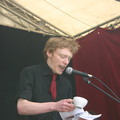
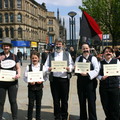
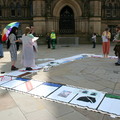
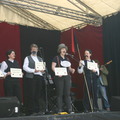
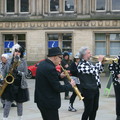
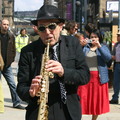
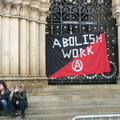
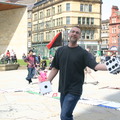
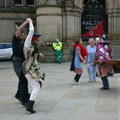
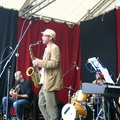
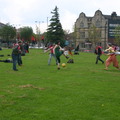

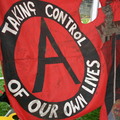
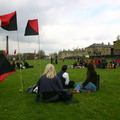
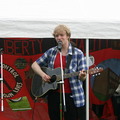
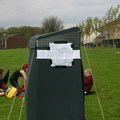
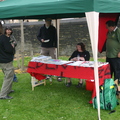
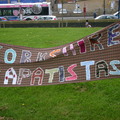
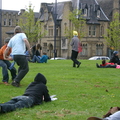
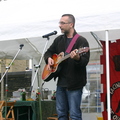
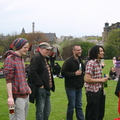
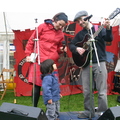
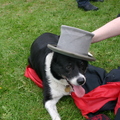
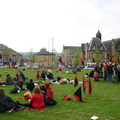
Click on a thumbnail for a slideshow view
What is the significance of MayDay?
May the first has long been a day of importance to workers movements around the world, but holds particular significance to the Anarchist movement as a day of remembrance for the Haymarket Martyrs. Here is a brief history of who they were and why they are so significant.
The story of the Haymarket Martyrs, and their monument in Forest Home Cemetery, begins at a convention of the Federation of Organized Trades and Labor Unions in 1884. The Federation (the predecessor to the American Federation of Labor) called for a great movement to win the 8-hour workday, which would climax on May 1, 1886.
The plan was to spend two years urging all American employers to adopt a standard 8-hour day, instead of the 10 to 12, even up to 16-hour days that were prevalent. After May 1 of 1886, all workers not yet on an 8-hour schedule, were to cease work in a nation-wide strike until their employer would meet the demand.
Although some employers did meet the deadline, many did not. Accordingly, great demonstrations took place on May 1 all across the country. Chicago’s was the biggest with an estimated 80,000 marching on Michigan Avenue, much to the alarm of Chicago’s business leaders and newspapers who saw it as foreshadowing “revolution,” and demanded a police crackdown.
In fact, the Anarchists and other political radicals in Chicago were reluctant to have anything to do with the 8-hour day strike, which they saw as “reformist;” but they were prevailed upon by the unionists to participate because Albert Parsons and others were such powerful orators and had a substantial following.
A mass meeting was called for the night of May 4, 1886 in the city haymarket at Randolph St. and DesPlaines Ave. Its purpose was to protest a police action from the previous day in which strikers and their supporters at the McCormick Reaper plant on Blue Island Ave. had been killed and injured by police.
The mass meeting in the haymarket was so poorly planned that the organizers had to round up speakers, including Parsons, at the spur of the moment. A rain began to fall, and as the last speaker was concluding, a large force of 200 police arrived with a demand that the meeting disperse.
Someone, unknown to this day, then threw a bomb at the massed police. In their confusion, the police began firing their weapons in the dark, killing at least four in the crowd and wounding many more. Several police were killed (only one by the bomb), the rest probably by police fire. The myth of the Haymarket Riot was born.
In the aftermath of the event, unions were raided all across the country. The Eight-Hour Movement was derailed and it was not until passage of the Fair Labor Standards Act in 1935, that the 8-hour workday became the national standard, a part of the Fair Labor Standards Act passed during President Franklin D. Roosevelt’s “New Deal.”
Albert Parsons and seven others associated with radical organizations were prosecuted in a show trial. None were linked to the unknown bomb thrower, and some were not even present at the time. They were held to be responsible for the bomb thrower’s act, because their public criticism of corporate America, the political structure, and the use of police power against the working people, was alleged to have inspired the bomber.
They were found guilty in a trial which Governor John Peter Altgeld subsequently held to be grossly unfair. On June 26, 1894, Altgeld pardoned those defendants still alive and in prison; but Parsons, Spies, Fischer, and Engel had been hanged, and Lingg was an apparent suicide.
The Haymarket case became a world-wide scandal. Governor Oglesby was petitioned by hundreds of thousands, including AFL President Samuel Gompers, to grant clemency, and thus prevent a miscarriage of justice by stopping the executions. It was to no avail. They were hanged on November 11, 1887.
In July of 1889, a delegate from the AFL attending an international labor conference in Paris, urged that May 1 of each year be celebrated as a day of labor solidarity. It was adopted. Accordingly, with the exception of the United States, workers throughout the world consider May First to be their “Labor Day” or "International Workers Day".
Why is it still relevant?
Despite nearly 125 years having passed since the Haymarket crowds assembled to call for an 8 hour day, many people both in the UK and particularly around the world have yet to see this happen. With the fixation of the predominant capitalist system still being firmly focused on consuming resources of all types, in ever greater quantities, the practise of hiring cheap labour willing to work longer and longer hours is still widespread.
The inevitable consequence of this is a workers movement littered with broken landscapes, broken communities, broken ecosystems and broken people. The annual celebration of May 1st offers an opportunity for workers around the world to regroup and show solidarity with one another. The call out for a global 8 hour day, fair pay and joint ownership of the workplace still reverberates strongly around the North of England, as it does elsewhere around the world.
As celebrations around the country wind to a close, plans are already being made for next years events. To get involved with the organising for the events that will take place in the Bradford area on May 1st 2011, the 125th anniversary of the Haymarket Rally, email reclaimmayday@lists.aktivix.org
 Contact email: imc-northern@lists.indymedia.org
Contact email: imc-northern@lists.indymedia.org





